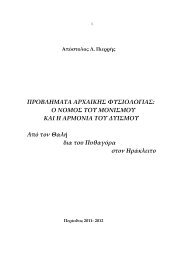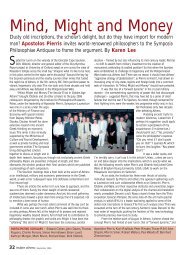APPENDIX C΄ ON DEPILATION: BODY COSMETICS IN CLASSICAL ...
APPENDIX C΄ ON DEPILATION: BODY COSMETICS IN CLASSICAL ...
APPENDIX C΄ ON DEPILATION: BODY COSMETICS IN CLASSICAL ...
You also want an ePaper? Increase the reach of your titles
YUMPU automatically turns print PDFs into web optimized ePapers that Google loves.
592 <strong>APPENDIX</strong> <strong>C΄</strong><br />
Fr. 473 Radt). The sense would present exactly the same kind of<br />
difficulty as the present one, but for Hesychius’ gloss on ΢ıÈÛÙd ¯ÂÈ-<br />
ÚfiÌ·ÎÙÚÔÓ: Ôî ·ı·È ÙáÓ Ï·Ì‚·ÓÔÌ¤ÓˆÓ âÓ appleÔϤÌÔȘ àÓıÚÒappleˆÓ<br />
(Lennep for the ms. Ï·Ì‚. appleÔÏÏÔÖ˜ zÓ; I would omit àÓıÚÒappleˆÓ<br />
altogether) Ùa˜ ÎÂÊ·Ïa˜ âΉ¤ÚÔÓÙ˜ +qÛ·Ó+ (something is missing<br />
here) àÓÙd ¯ÂÈÚÔÌ¿ÎÙÚˆÓ â¯ÚáÓÙÔ. For details, see Herodotus IV, 64.<br />
In other cases the play is more obvious. Thus in Pollux, IX, 71, we<br />
have a Hermippian fragment from ¢ËÌfiÙ·È (Fr. I Meineke, vol. II p.<br />
385 = Fr. 13 PCGr. vol. V p. 568): OúÌÔÈ, Ù› ‰Ú¿Ûˆ ۇ̂ÔÏÔÓ ÎÂηÚ-<br />
̤ÓÔ˜; which is explained by Pollux as follows: ÂúË ‰’ iÓ Î·d ۇ̂ÔÏÔÓ<br />
‚Ú·¯f ÓÔÌÈÛÌ¿ÙÈÔÓ, ìÌ›ÙÔÌfiÓ ÙÈ ÓÔÌ›ÛÌ·ÙÔ˜; thus the speaker in the<br />
fragment must have been tonsured on half of his head only, for some<br />
reason: ÎÂοÚı·È öÔÈΠÙe ≥ÌÈÛ˘. (Pollux then goes on to explain how<br />
the ۇ̂ÔÏÔÓ can be half a coin in an appropriate sense. Other things,<br />
like knucklebones, could be used for ۇ̂ÔÏ· - Û‡Ì+‚¿Ïψ - for<br />
purposes of indisputable identification and recognition: v. Scholia to<br />
Euripides Medea, 610). The same expression could be used in<br />
describing a half-shaven face. This is what happens to Mnesilochus<br />
when he tries to escape in the midst of his sufferings at Euripides’<br />
hands; Thesmoph. 226-7: ÔûÎÔ˘Ó Î·Ù·Á¤Ï·ÛÙÔ˜ ‰ÉÙ’ öÛÂÈ / ÙcÓ<br />
ìÌ›ÎÚ·ÈÚ·Ó ÙcÓ ëÙ¤Ú·Ó „ÈÏcÓ ö¯ˆÓ. Such a case of literally<br />
incongruous combination of elements is, I think, presented by our<br />
present passage; Ecclesiaz., 719 sqq. An antithesis to the Ôé¯d ‰ÂÖ<br />
ÎÔÛÌÔ˘Ì¤Ó·˜ is needed; thus, after: they must sleep with slaves only,<br />
we could expect: either (1) wearing a slave-dress, or (2) having hair<br />
dresses appropriate to slaves. Additionally some reference to their<br />
sexual condition would be more than likely. Aristophanes boldly<br />
combines all three expected elements in an utterly unexpected<br />
formation: ¯ÔÖÚÔ˜ provides the sexual reference; ηوӿÎË the dress<br />
proper to slaves; àappleÔÙÂÙÈÏ̤ӷ˜ (in place of the would-be àappleÔÎÂηÚ-<br />
̤ӷ˜ were it about hair-dressing proper, on the head) the some<br />
characteristic hair-dressing, like the ÛοÊÈÔÓ àappleÔÎÂηṲ́ÓËÓ of<br />
Thesmoph. 838, where see the scholia. The joke is that the slave girls<br />
must not only be not allowed to beautify themselves, but even their<br />
pudendum must be depilated in a slave-fashion! An Aristophanic<br />
comic extravagance.<br />
That youths and young men had their pubic hair dressed in<br />
various ways and shapes already in archaic times is amply testified by










